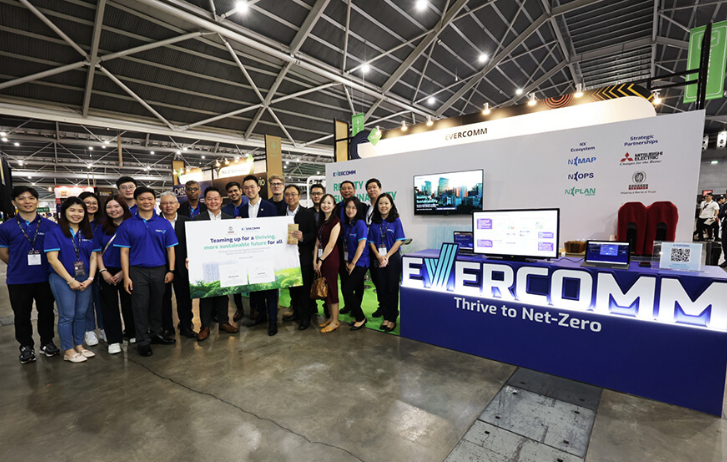
The Singaporean CEO Helping Companies Reach Net-Zero
By Ted Chen | November 21, 2023
Meet Ted Chen, co-founder and CEO of Evercomm Singapore, as he shares how his AI start-up is making waves in the cleantech sector and helping companies become more sustainable.
Many young entrepreneurs today set out to make a difference. They don’t want to just succeed in business. They also want to create a positive impact on society and the planet. My company, Evercomm, was founded in the same spirit.
From engineering student to cleantech founder
My background is in engineering. While studying power systems and renewable energy at Nanyang Technological University (NTU), I saw many of my peers gravitating towards the oil and gas sector. I wanted to do the opposite. To me, it was important to find alternative pathways to a more sustainable world.
I couldn't find companies that shared my viewpoint, or jobs that would allow me to take these ideals for a cleaner world forward. That’s why I co-founded Evercomm in 2013, now one of Asia Pacific’s fastest-growing sustainability AI companies in the cleantech sector.
Our idea is simple: to help companies optimize their use of energy and reduce their carbon footprint. We show them how much energy they’re using, how much energy they need, and where they can cut costs.
In return, they benefit from increased cost efficiency and receive proper validation for their efforts to achieve net zero emissions. We help companies of all kinds with net-zero digital planning and management, guiding them on their path to net-zero carbon emissions. Our decarbonization solutions include carbon emission compliance disclosure, operational digitization and automation, and net-zero planning simulation and optimization.
Our goal is for people, companies and governments everywhere to leave a better world for the generations to come.
Overcoming challenges to get our start-up off the ground
It has taken nearly a decade to get to where we are now. Over the years, we’ve evolved from a humble startup at NTU to a venture-backed, deep-tech, scale-up company.
Back in 2013, when we were formulating plans to start Evercomm, many people thought we were a charity. It took time and effort to explain our concept to potential partners. Finally, Enterprise Singapore, the first organization to believe in us, gave us a grant of half a million Singapore dollars to develop our idea further. This kickstarted things for us. The grant meant that people finally started to take us seriously.
To get things off the ground, especially identifying and developing the right tech, it was important to source proper support. I worked closely with NTU to co-develop and license technology early on to bridge the tech skills gap. Since then, we’ve grown and leveraged our own technology.
Why it’s important for businesses to measure sustainability progress
Every single company, no matter the industry or scale, needs to be accountable for their own emissions and how they operate. A lot of what we do is education and awareness. Many businesses want to start reducing their emissions but have no idea where to start.
We work with our customers on this journey, evaluating their carbon footprint, scrutinizing resource consumption, and examining waste management protocols. Once we have that data, businesses can devise strategies to curtail emissions, and go ahead and adopt specific sustainable measures or new emission-reduction technology.
I believe tracking sustainability goals is crucial for multiple reasons.
Clear roadmap
Tracking sustainability goals provides businesses with a clear roadmap and benchmarks, guaranteeing they’re on course to meet their sustainability objectives.
Accountability
It also fosters accountability. By quantifying their environmental impact, companies can make data-driven decisions to manage and counteract climate-related risks.
Transparency
In today’s world, stakeholders—including customers, investors and employees—prioritize transparency. We encourage businesses to be proactive. Get ahead of the conversation. Don’t wait for your stakeholders to ask you first.
By transparently sharing these results with stakeholders and making proper carbon emission disclosures, businesses can proudly manifest their dedication to sustainability, and preempt potential allegations of greenwashing.
Competitive advantage
By diligently tracking and communicating their sustainability progress, businesses can build trust with stakeholders and position themselves as frontrunners in the green economy. When it comes to competitive advantage, your track record on sustainability may just be the thing that sets you apart from your industry peers.
Expanding our Singapore start-up across Asia Pacific
We started small and local as a team of three, with some clients in Singapore who took a chance and trusted our vision. By 2019, we’d delivered over US$3.4 million in energy savings for our clients.
Today, we have over 50 employees, working with clients across APAC, including manufacturers, property groups, and banks such as UOB and CIMB.



Three years after Evercomm was founded, we crossed the million-dollar revenue mark. As we celebrate our 10th anniversary, we are expanding into key Southeast Asia countries with partners like Mitsubishi Electric, who also participated in our latest investment round.
We also work closely with the United Nations and governments worldwide to pilot industry-scale sustainability transformation initiatives.
The current landscape in sustainability is rapidly evolving. Globally, there’s a concerted effort to achieve net zero, with numerous nations and corporations charting aggressive goals. In APAC, we’re seeing a growing interest in tapping into green financing products, propelling the uptake of low-carbon technologies and processes.
The momentum is shifting towards circular economies, with an emphasis on reusing and recycling to reduce waste and carbon emissions. The wave of digital transformation, underscored by AI and IoT, is further revolutionizing and enhancing sustainable practices.
What businesses need to do when pursuing clean tech
For those keen on embracing clean tech, here are a few tips:
1. Understand your current carbon footprint
It’s essential to first gain a thorough understanding of your organization’s current carbon footprint. Jumpstarting your decarbonization journey is easy. With the right tools, you can generate your carbon emission profile in days.
2. Engage with your customers
It’s important to engage with your customers to find out their sustainability strategy. That way, you can make sure your emission reduction strategy aligns with their expectations, pinpointing areas where clean tech can make a transformative impact. This alignment is pivotal to ensure your organization remains relevant, retains existing customers, and is able to attract new ones.
3. Keep your eye on the latest innovations
You must stay updated with the latest tech breakthroughs in the sector, as innovation never stops. I recommend cultivating relationships with industry experts and seeking partnerships that can bolster your efforts.
4. Sustainability is an investment, not a cost
Most importantly, don't perceive sustainability as just another cost. When managed correctly, emission reduction not only offers cost-saving opportunities, but also sets you on a path to thrive in the green economy. If we can all persuade our customers, partners and stakeholders to pursue a long-term commitment to sustainability, we’re helping to create a cleaner tomorrow for all. Personally, what drives me is seeing businesses transform. We celebrate when we see our customers receive public recognition and accolades for their sustainability efforts.
For me, it’s not enough to innovate and succeed as an entrepreneur. We should all try to set a new standard for entrepreneurship, to be the driving force and inspiration for generations to come.
SHARE THIS STORY
- Generative AI: A New Frontier
- How To Ship A Giant Panda
- How To Make Freight Shipments Work For Your Small Business
- The Rise Of Intra-Asia Trade: Opportunities In The China-Southeast Asia Corridor
- Where Do Old Planes Go When They Retire?
- What’s So Dangerous About Coconuts? Your Guide To Dangerous Goods Logistics
Sign up now and save on your shipping rates!
Sign up now and earn discounts by shipping instantly with FedEx Ship ManagerTM at fedex.com.
Recommended For You

E-Tailers: Your Customers Are Shopping More Sustainably
For small businesses, easy-to-implement sustainability wins can have a huge impact on consumer perception and spending.
Read More
The Thai Beeswax Brand Making Households More Sustainable
SuperBee was a small business making homemade beeswax wraps in Northern Thailand, but now it has expanded to global markets.
Read More
How We Recycled Old Uniforms Into New Caps In Thailand
At FedEx, we’re working hard to put sustainability at the center of our business.
Read More

